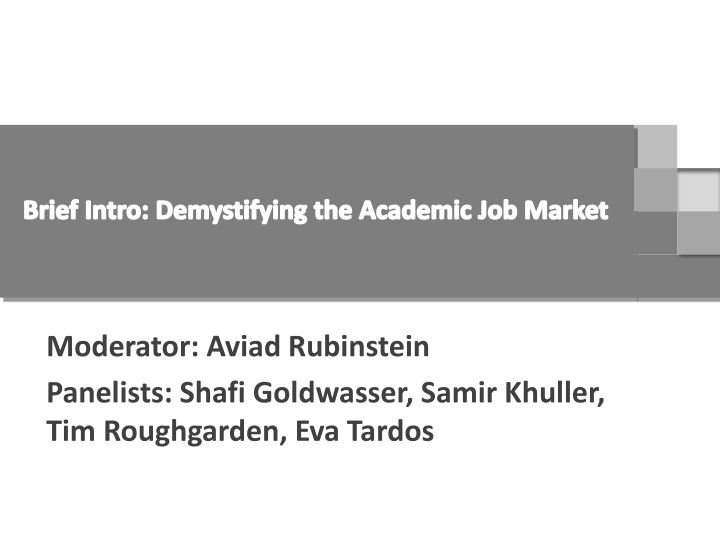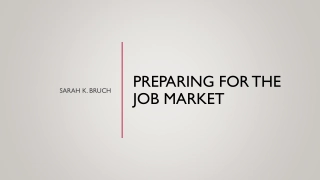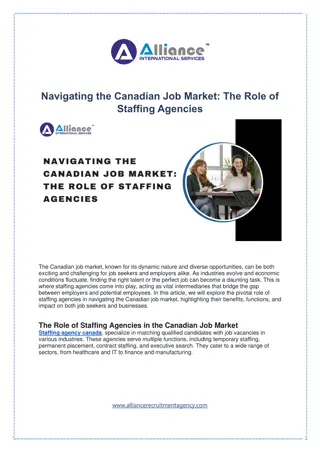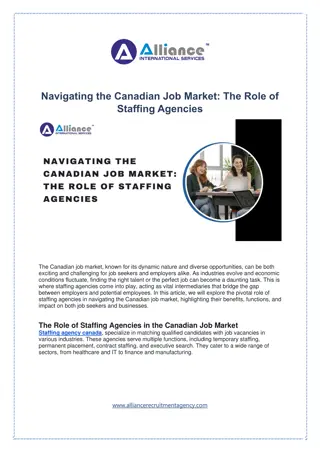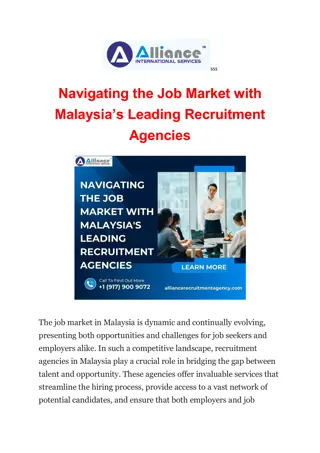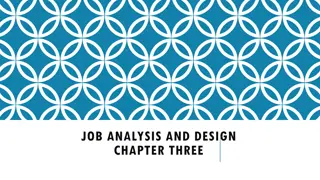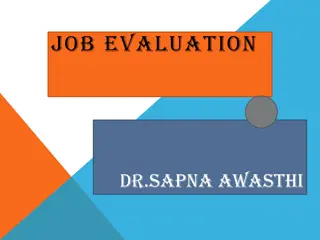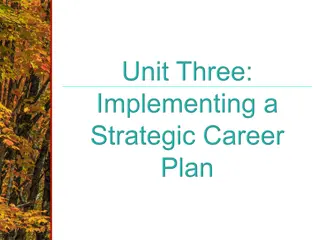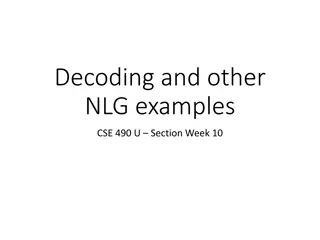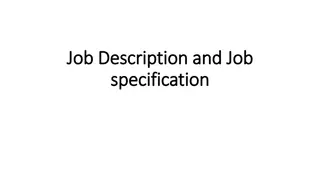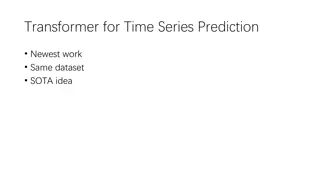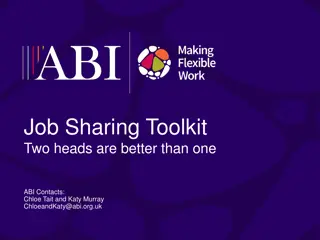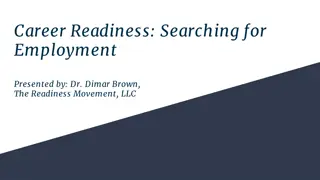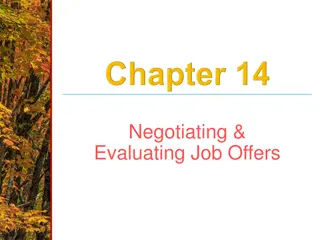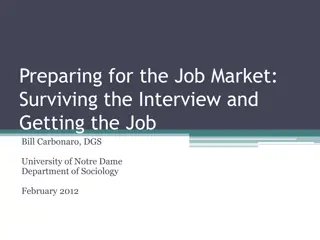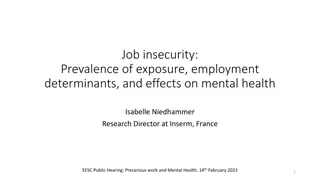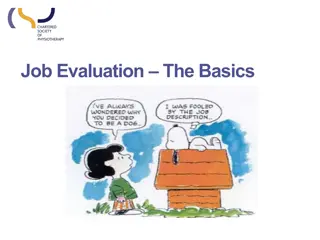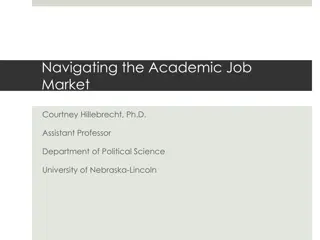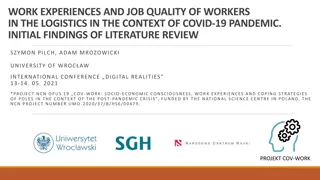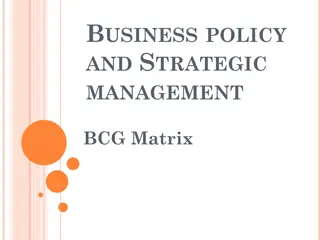Decoding Academic Job Market Basics
Unravel the essentials of the academic job market with insights from experts in the field. Understand the importance of research, talks, community engagement, and application components such as research statements, CVs, and letters. Gain quick tips for building a strong application for your dream job.
Download Presentation

Please find below an Image/Link to download the presentation.
The content on the website is provided AS IS for your information and personal use only. It may not be sold, licensed, or shared on other websites without obtaining consent from the author.If you encounter any issues during the download, it is possible that the publisher has removed the file from their server.
You are allowed to download the files provided on this website for personal or commercial use, subject to the condition that they are used lawfully. All files are the property of their respective owners.
The content on the website is provided AS IS for your information and personal use only. It may not be sold, licensed, or shared on other websites without obtaining consent from the author.
E N D
Presentation Transcript
Brief Intro: Demystifying the Academic Job Market Moderator: Aviad Rubinstein Panelists: Shafi Goldwasser, Samir Khuller, Tim Roughgarden, Eva Tardos
The first step to the job of your dreams is attending this workshop! Coming up in this session: I ll present some basics-of-the-job-market for 5~10 minutes I ll let our panelist talk Please observe Chatham House Rules throughout the workshop (You can say what you what heard, but not whom you heard it from) We ll post these slides and you can blame us for anything in them Note: These slides are nowhere near comprehensive advice. They were just used to initiate discussion among the panelists. Think of them as a framework to get started asking advisers/ect. for deeper advice, and not as comprehensive advice themselves.
Way Before the Job Market Main Goal: Build a strong application! Do good research. Give good talks. Maintain good standing in your community (e.g. write thoughtful reviews, etc.). Quick Tips: Don t overthink it, enjoy research! Keep an eye out for opportunities to give talks (workshops, student seminars, etc.). Try to help with service when asked (and do a good job), makes a good impression. But absolutely OK to say no if you really need to.
Building Your Application: Research Statement Behind the Scenes: Most readers will skim your statement. But, some will want details. Reader will try to summarize in five sentences for colleagues. Quick Tips: Make it skimmable. Ex: get your main thesis across clearly in a brief intro. Back it up later. Ex: use out-of-line environments to emphasize key points. But also be precise. OK not to get into technicalities, but don t confuse reader. Give the reader easy sound bites to copy. In one sentence, my research
Building Your Application: CV Behind the Scenes: Not a huge part of the application. Major awards stand out, but OK not to have. Quick Tips: Find a template (perhaps from adviser) and copy it. Don t stress about this.
Building Your Application: Letters Behind the Scenes: Probably the most important part of the application. Readers like to quote superlatives. Letter writers want you to succeed, but may not know all the important details. Quick Tips: Ideally, only ask people who know you well. Three stellar/detailed letters better alone than adding lukewarm/vague ones. Try to give potential writers an out when you ask. E.g. I can ask others if you don t feel comfortable. Help letter writers help you succeed. Ex: share CV, research statement, etc. Ex: share brief reminder of your work you hope they find exciting. Ex: if for a teaching (or other special position), let them know!
Building Your Application: Teaching Statement Behind the Scenes: Likely skimmed (or less). But, some people really care (can help pick up support outside research area). Used to gauge what classes you might teach. Quick Tips: Mention explicitly what classes you could teach. Do a good job, but don t stress too much about it. Almost all teaching statements are in the same equivalence class.
Building Your Application: Cover Letter Behind the Scenes: Possibly not even read. Can be useful to clarify precisely what position you re applying for. Quick Tips: Really don t stress about this. Just get a template and copy it.
Reaching out to Contacts Behind the Scenes: The process is extremely disorganized! Small committee reads through applications, might not be an expert in your area. Committee might get heads up to keep an eye out. Quick Tips: If you know someone at an institution well, OK to send a quick email just giving a heads up that you applied. OK to ask if your adviser is comfortable sending a few emails for you. OK to email someone who knows your work and might be excited. Don t overdo it --- unclear it s helpful to email someone who won t know you. You re not trying to get someone excited about your application from an email, just trying to help your application get seen.
Waiting to Hear about Interviews Behind the Scenes: The process is extremely disorganized! Letters sometimes arrive late. Faculty miss meetings, which may push back timeline. Quick Tips: Don t freak out! Interview invitations come at random times.
Interviews: General Behind the Scenes: If you re invited for an interview, host wants you to succeed! Everyone wants to be excited about hiring you (not an adversarial process). Quick Tips: OK to make reasonable requests (e.g. specify dietary restrictions for dinner). OK to ask host for tips (within reason). Ex: Am I being interviewed for a specific research area? Ex: Should I tailor my talk to theory or general audience? Ex: Anything special about your process that I should prepare specifically for?
Interviews: Job Talk Behind the Scenes: Replaces research statement: will try to summarize in five sentences. But now, everyone will also want some depth (within reason, given an hour). Most of the department will judge entirely on this. Quick Tips: See Eshan and Pravesh later today! Give tons (and tons) of practice talks. Seek feedback specifically from non-theorists!
Interviews: Interviews Behind the Scenes: Everyone has a different style. Some will just chat, or already start trying to recruit you. Some will ask detailed questions about your own work. Some will engage you discussing their own work. Everyone is evaluating you, regardless of style. Quick Tips: Don t overprepare: most people s websites are out of date anyway. But, at least know interviewer s rough interests/area.
Waiting to Hear about Offers Behind the Scenes: The process is extremely disorganized! Discussion usually starts within a week of interview, but can last several weeks. Some programs make offers sequentially, others wait until the end. Quick Tips: Don t take it personally if an offer doesn t happen --- it s a noisy process.
